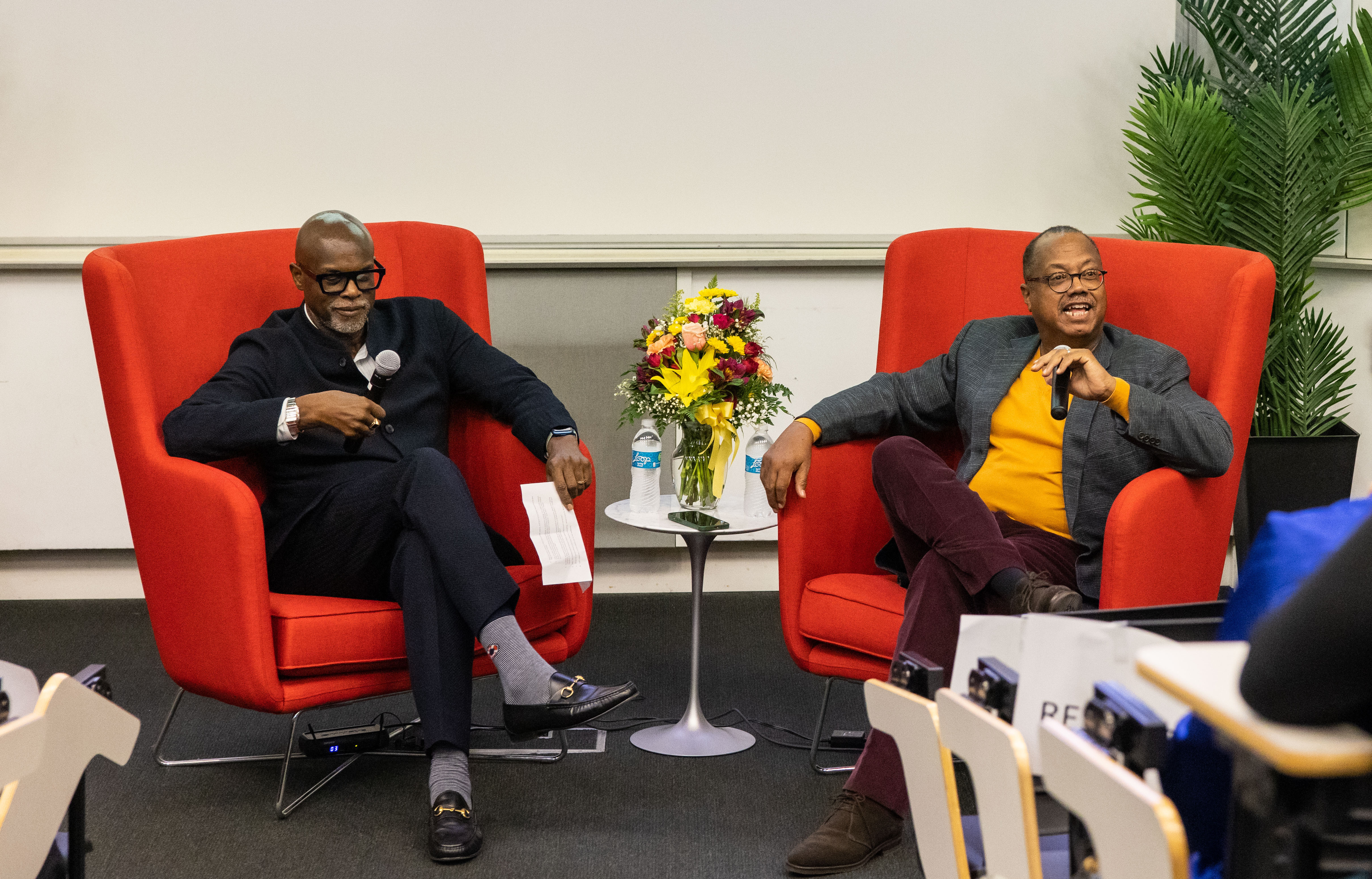
Image: Aditya Irawan/NurPhoto via AP Images

When Pulitzer Prize-winning New York Times journalist Brent Staples wrote his essay “Just Walk on By” in the mid-1980s—first published in Ms. magazine and later retitled “Black Men in Public Spaces”—he says it was out of a personal necessity.
At the time, as a 22-year-old new to Chicago, he’d started noticing reactions to his presence that were strange and different from what he’d experienced growing up in a small Pennsylvania steel and shipping town. “People who saw me would cross the street, or when I crossed in front of a car at a stoplight, people would hit the door locks,” he told an audience recently at Penn’s Annenberg School for Communication.
He realized for the first time that people saw him as dangerous, “as a monster,” he recalled. “That experience in the new white world launched my writing career because I really needed to actually get that down on paper, to wrestle with it to some degree, to understand how it made me feel and how other people were feeling. That was my introduction to the otherness of being Black.”
Staples detailed this and many aspects of his personal and professional journey at the inaugural W.E.B. Du Bois Lecture in Public Social Science put on by the Department of Sociology in Penn’s School of Arts & Sciences in collaboration with Annenberg and the Center for Africana Studies. Tukufu Zuberi, the Lasry Family Professor of Race Relations in the departments of Sociology and Africana Studies, joined Staples in a conversation introduced by Penn President Liz Magill.
In opening remarks, Magill reflected on the event’s namesake, who, as a temporary instructor at Penn in the late 1890s, conducted revolutionary research on the sociological conditions in Philadelphia’s Seventh Ward neighborhood. “Out of his pioneering work came ‘The Philadelphia Negro’ published by the University of Pennsylvania Press in 1899,” she said. “It is considered the first scientific study of race.”
Magill then referenced an idea Du Bois spelled out in his later autobiography, “Dusk of Dawn,” about knowledge based on scientific investigation being the cure to the “ultimate evil of stupidity,” which propelled Du Bois’ intellectual curiosity and resistance against white supremacy. Magill noted placing such value on science-backed knowledge is today one of Penn’s most critical missions.
“I’m very excited that this is the first of what will be many W.E.B. Du Bois lectures in public social science,” Magill said. “This program recognizes and amplifies one of the leading intellectuals of the late 18th, 19th, and 20th centuries. It’s another way Penn celebrates Du Bois and gives us a new platform for continuing his very vital legacy.”
Magill then turned it over to Zuberi, who asked Staples to first reflect on how Du Bois had influenced him personally. Staples brought up an 1898 coup in Wilmington, North Carolina, in which white people violently and forcibly removed Black government officials. “Du Bois himself was paying attention at that time,” Staples said. “He saw that as the beginning of a series of events in which the gains that Black people had acquired during Reconstruction—the right to vote, the right to hold office—that those gains were going to be violently suppressed.”
After the Jan. 6, 2021 attack on the U.S. Capitol, Staples wrote a piece for The New York Times comparing the event to the 1898 coup. In both cases, “the white supremacist forces had decided that the only good government was white government,” Staples said, adding, “I am still writing about the themes—and in some cases, the specific people—that Du Bois had in his life and was talking about. I am showing that the ideas that those people represent, those ideas are still alive among us, and they still have an impact on how society works.”
Zuberi asked Staples to dig even deeper. “Can you talk a little bit about how you came to this work? Du Bois’ story, how he gets there, is frustration at having written several very important texts that he thought would be picked up by sociology” but that weren’t, Zuberi said. “He’s criticizing sociology for being hesitant to take the work where it will go. Are we still in that kind of moment? Are we still in a moment where Jim Crow is still here?”
I am still writing about the themes—and in some cases, the specific people—that Du Bois had in his life and was talking about. I am showing that the ideas that those people represent, those ideas are still alive among us, and they still have an impact on how society works.
New York Times journalist Brent Staples
Staples shared a telling anecdote: He’d earned a Ph.D. in psychology, assuming he’d pursue a career in academia. “Then I got a taste of directly engaging with the public through my writing,” he said. Seven years into his tenure at a publication, which he declined to name, he argued with an editor, whom he declined to name, over a piece he wanted to publish about the history of race in the United States.
“I said, ‘Listen. My great-grandfather, John Wesley Staples, who died 11 years before I was born, narrowly missed being a slave, very narrowly. His older siblings were slaves. His mother was enslaved. His cousins were enslaved, and my father and his brothers grew up in their houses in the company of formerly enslaved people. So, my role as one of the first college graduates in the family line, and certainly the first person to have a public platform, is to tell the hard truth about race and history in America no matter what.’ And I said, ‘If I can’t tell the truth on these issues in this job, I will quit and go wash cars.’”
Staples said he felt an opportunity and an obligation to bring such discussions to a broad public and to keep them there. He conveyed this sentiment when talking about his childhood, growing up the second oldest of nine children in a town where he watched the shipping industry dwindle away. He discussed it in regard to his education at Widener University and the University of Chicago and his experience as one of the few Black writers and editors at journalistic outlets where he worked, even about winning the Pulitzer in 2019.
To that last point, Zuberi asked if the award, that moment, felt to Staples like he had finally arrived. “I was very flattered to get it, but in actuality, it was an outcome of me plugging away writing for 20 years, for 25 years, until the moment came, you know, until the moment came.” That seemed Staples’ overarching lesson, one gleaned from his own experiences and those of the many who came before him, Du Bois included: Keep toiling and pushing, speaking truth to power, until the moment of change finally comes.
Michele W. Berger
Eddy Marenco

Image: Aditya Irawan/NurPhoto via AP Images

nocred

Image: Michael Levine

A West Philadelphia High School student practices the drum as part of a July summer program in partnership with the Netter Center for Community Partnerships and nonprofit Musicopia.
nocred